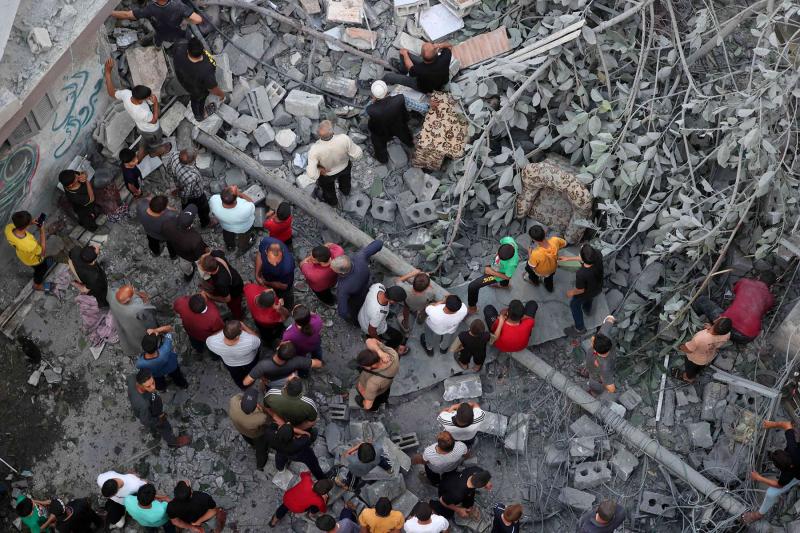JERUSALEM
Israeli ministers dismissed Friday’s ruling by the International Court of Justice (ICJ) ordering Israel to “immediately” cease its military operation in the southern Gaza city of Rafah, vowing instead to continue fighting.
In spite of the ICJ ruling, Israel carried out strikes on the Gaza Strip on Saturday morning as fighting raged between the army and Hamas’ armed wing. Israeli strikes were reported in Rafah and the central city of Deir al-Balah while UN humanitarian chief Martin Griffiths described the situation as “a nightmare”.
Friday’s ruling by the World Court was the latest in a series of steps in recent weeks that have deepened Israel’s international isolation over its conduct of the war in Gaza, which has killed more than 35,000 Palestinians after an attack by Hamas on October 7 killed about 1,200 Israelis and took scores of hostages.
Prime Minister Binyamin Netanyahu’s office rejected the allegations in the case brought by South Africa that Israel was carrying out genocide in Gaza as “false, outrageous and morally repugnant”
“Israel is acting based on its right to defend its territory and its citizens, consistent with its moral values and in compliance with international law,” it said in a statement.
There is no practical mechanism to force Israel to comply with the court order, which, in addition to ordering a halt to the offensive, also mandates an increase of humanitarian aid to the region and access to Gaza for war crimes investigators.
The court’s demands go beyond what the US has asked of Israel at the moment, though Washington has nonetheless signalled that it remains opposed to a more intrusive operation in Gaza.
“When it comes to Rafah, we’ve made known for a long time our concerns about a full-on military assault of Rafah and the damage that that could do to civilian population absent a clear and credible plan to protect it,” Secretary of State Antony Blinken told the US House Foreign Affairs Committee on Wednesday.
Blinken also reiterated that the administration does not believe a major offensive would achieve the results that Israel is looking to achieve, “which is to deal effectively and durably with Hamas.”
“Our concerns about a full-on military assault in Rafah remain,” he said. “We have other ways of dealing with the challenge posed by Hamas that we believe can be more effective and more durable.”
The war has caused a widening gulf between Israel and much of the rest of the world and serious strains between Netanyahu’s government and its closest allies, including the United States.
Rafah, close to the border with Egypt, had taken in more than one million Palestinians displaced from their homes by the Israeli ground assault until an evacuation order by the military earlier this month sent hundreds of thousands to seek refuge in camps in central Gaza.
Outside Israel, there has been shock at the harrowing television images of the suffering in the ruins of Gaza, where aid agencies, struggling to get enough emergency supplies in, report a growing humanitarian crisis.
The immediate practical impact on Israeli policy is likely to be limited, beyond reinforcing a supportive national mood already stoked by the International Criminal Court prosecutor’s decision to seek arrest warrants against Netanyahu and Defence Minister Yoav Gallant.
Internal Security Minister Itamar Ben-Gvir, who heads a hardline nationalist religious party that is key to the stability of Netanyahu’s coalition, dismissed the ruling.
“Our future doesn’t depend on what the Gentiles say but rather what the Jews do,” he said on social media platform X, quoting a celebrated remark by David Ben Gurion, Israel’s first prime minister.
The case before the ICJ was brought by South Africa on the basis that by killing Palestinians in Gaza, causing them serious mental and bodily harm and creating conditions of life “calculated to bring about their physical destruction”, Israel is committing genocide against them.
Shortly after the ruling in the Hague was read out, residents in Rafah, where the Israeli army has been carrying out probing attacks on the city’s edges, reported a particularly heavy air strike.
Israeli forces have been massed at the city’s edges for weeks ahead of a long announced operation to destroy the four remaining Hamas battalions the army says are based there.
However, heavy fighting has also continued in other areas of Gaza, notably in the northern area of Jabaliya, where the army said earlier it had recovered the bodies of three hostages killed on October 7.
War cabinet minister Benny Gantz said Israel ‘is committed to continue fighting to return its hostages and promise the security of its citizens – wherever and whenever necessary – including in Rafah,” he said in a statement.
Most Palestinians were sceptical of Israel’s willingness to abide by the ICJ ruling.
“Israel doesn’t care about the world, it acts as if it was above the law because the US administration is shielding it against punishment,” Shaban Abdel-Raouf, a Palestinian displaced four times by the Israeli offensive, told Reuters.


